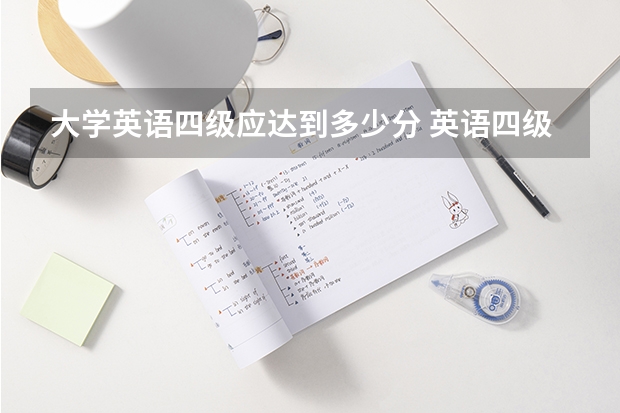去年大学英语四级考试真题 求2022年大学英语四级真题下载?
2023-09-16 17:41:37 | 蜕变培训网

2014年6月大学英语四级阅读真题及参考答案
有道是得阅读者得四级,阅读的分数占英语四级总分的百分之三十五,不用紧张,同学们认真备考多练习,定然能考出好的成绩,以下2篇深度阅读。
阅读一
A letter to Edward,a columnist(报刊专栏作家)
Dear Mr. Expert:
I grew up in an unhappy and abusive home.I always promised myself that I’d get out as soon as possible.Now,at age 20,I have a good job and a nice house,and I’m really proud of the independence I’ve achieved.
Here’s the problem:several of my friends who still live with their parents wish they had places like mine—so much so that they make mine theirs.
It started out with a couple of them spending the weekends with me.But now they seem to take it for granted that they can show up any time they like.They bring
boyfriends over,talk on the phone and stay out forever.
I enjoy having my friends here sometimes—it makes the place feel comfortable and warm—but this is my home,not a party house.I was old enough to move out on my own,so why can’t I seem to ask my friends to respect my privacy(隐私)?
Joan
Edward’s reply to Joan
Dear Joan:
If your family didn’t pay attention to your needs when you were a child,you probably have trouble letting others know your needs now.
And if you’ve gathered your friends around you to rebuild a happy family atmosphere(气氛),you may fear that saying no will bring back the kind of conflict you grew up with—or destroy the nice atmosphere you now enjoy.You need to understand that in true friendship it’s okay to put your own needs first from time to time.
Be clear about the message you want to send.For example,“I really love your company but I also need some privacy.So please call before you come over.”
Edward
1.We can learn from the first letter that Joan______.
A.lives away from her parents B.takes pride in her friends
C.knows Mr.Expert quite well D.hates her parents very much
2.We can infer from the first letter that______.
A.Joan considers her friends more important than her privacy
B.Joan’s friends visit her more often than she can accept
C.Joan doesn’t like the parties at all
D.Joan dislikes the boyfriends her friends bring over
3.According to Mr. Expert,why can’t Joan tell her friends her feelings?
A.She is afraid of hurting her friends. B.She does not understand true friendship.
C.Her family experience stops her from doing so. D.She does not put her needs first.
4.The underlined word“conflict”in the second letter means______.
A.dependent life B.fierce fight C.bad manners D.painful feeling
5.The second letter suggests that Mr. Expert______.
A.is worried about Joan’s problem B.warns Joan not to quarrel with her friends
C.advises Joan on how to refuse people D.encourages Joan to be brave enough
答案 1.A 2.B 3.C 4.B 5.C

2014年6月大学英语四级听力真题及答案
再过半个月就要进行英语四级考试了,这时候同学们可以赶紧做做真题来找到考试的感觉,通过做真题你会发现一些规律,找到解题方法。为大家准备了2014年6月英语四级考试听力真题及答案,一起来看看吧!有需要的朋友可以收藏起来!
2014年6月大学英语四级听力真题及答案
Listening Comprehension (30 minutes) Section A
Directions: In this section, you will hear 8 short conversations and 2 long conversations. At the end of each conversation, one or more questions will be asked about what was said. Both the conversation and the questions will be spoken only once. After each question there will be a pause. During the pause, you must read the four choices marked A), B), C) and D), and decide which is the best answer. Then mark the corresponding letter on Answer Sheet 1 with a single line through the centre.
注意:此部分试题请在答题卡1上作答。
1. A. See a doctor about her strained shoulder B.Use a ladder to help her reach the tea. C.Replace the cupboard with a new one. D.Place the tea on a lower shelf next time.
1. W: I can’t seem to reach the tea at the back of the cupboard。 M: Oh„ Why don’t you use the ladder? You might strain your shoulder。 Q: What does the man suggest the woman do?
2. A. At Mary Johnson’s B. In an exhibition hall C. At a painter’s studio. D. Outside an art gallery.
2. W: Since it’s raining so hard, let’s go and see the new exhibits。 M: That’s a good idea. Mary Johnson is one of my favorite painters。 Q: Where does the conversation most probably take place?
3. A. The teacher evaluated lacks teaching experience.
B. She does not quite agree with what the man said. C. The man had better talk with the students himself. D. New students usually cannot offer a fair evaluation.
3. M: I hear the students gave the new teacher an unfair evaluation。 W: It depends on which student you are talking about。 Q: What does the woman imply?
4. A. He helped Doris build up the furniture. B. Doris helped him arrange the furniture. C. Doris fixed up some of the bookshelves. D. He was good at assembling bookshelves.
4. W: It must have taken you a long time to fix up all these book shelves。 M: It wasn’t too bad. I got Doris to do some of them。 Q: What does the man mean?
5. A. He doesn’t get on with the others. B. He doesn’t feel at ease in the firm. C. He has been taken for a fool. D. He has found a better position.
5. W: Rod, I hear you’ll be leaving at the end of this month. Is it true?
M: Yeah. I’ve been offered a much better position with another firm. I’d be a fool to turn it down。 Q: Why is the man quitting his job?
6. A. They should finish the work as soon as possible. B. He will continue to work in the garden himself. C. He is tired of doing gardening on weekends. D. They can hire a gardener to do the work.
6. W: I honestly don’t want to continue the gardening tomorrow, Tony? M: Neither do I. But I think we should get it over with this weekend。 Q: What does the man mean?
7. A. The man has to get rid of the used furniture. B. The man’s apartment is ready for rent. C. The furniture is covered with lots of dust. D. The furniture the man bought is inexpensive.
7. W: You’ve already furnished your apartment? M: I found some used furniture that was dirt cheap。 Q: What do we learn from the conversation?
8. A. The man will give the mechanic a call. B. The woman is waiting for a call. C. The woman is doing some repairs. D. The man knows the mechanic very well.
8. W: Has the mechanic called the bus repairers?
M: Not yet .I’ll let you know when he calls。 Q: What do we learn from the conversation?
9. A. She had a job interview to attend. B. She was busy finishing her project. C. She had to attend an important meeting. D. She was in the middle of writing an essay.
Question: 9. Why couldn’t the woman’s roommate attend the Shakespearean English class that afternoon? W: Nothing, it’s just that she submitted a job application yesterday and the company asked her in for an interview today. She’s afraid she won’t be able to attend your class this afternoon though. I’m calling to see whether it would be OK if I gave you her essay. Janet said it’s due today。
10. A. Accompany her roommate to the classroom. B. Hand in her roommate’s application form. C. Submit her roommate’s assignment. D. Help her roommate with her report.
Question: 10. What favor is the woman going to do for her roommate?
11. A. Where Dr. Ellis’s office is located. B. When Dr. Ellis leaves his office. C. Directions to the classroom building. D. Dr. Ellis’s schedule for the afternoon.
Question: 11. What does the woman want to know at the end of the conversation?
W: Fine, please tell her I’ll be there at 4:00. And Dr. Ellis, one more thing, could you tell me where your office is? Janet told me where your class is, but she didn’t give me directions to your office。
12. A. He find it rather stressful. B. He is thinking of quitting it. C. He can handle it quite well. D. He has to work extra hours.
Question: 12. What does the man say about his job?
M: Not bad, Jane. I’m involved in several projects and it’s a long working day. But I’m used to that so it doesn’t bother me too much。
13. A. The 6:00 one B. The 6:30 one. C. The 7:00 one D. The 7:30 one Question: 13. Which train does the man take to work every day?
M: It was terrible at first, especially getting up before dawn to catch that 6:30 train. But it’s bearable now that I’ m used to it。
14. A. It is an awful waste of time. B. He finds it rather unbearable. C. The time on the train is enjoyable. D. It is something difficult to get used to.
Question: 14. How does the man feel about commuting to work every day now?
W: Don’t you think it’s an awful waste of time? I couldn’t bear to spend three hours sitting in a train every day。
M: I used to feel the same as you. But now I quite enjoy it。
15. A. Reading newspaper. B. Chatting with friends. C. Listening to the daily news. D. Planning the day’s work.
Question: 15. How does the man spend his time on the morning train?
W: How do you pass the time? Do you bring some work with you to do on the train?
M: Ah, that’s a good question. In the morning, I just sit in comfort and read the papers to catch up with the news. On the way home at night, I relax with a good book or chat with friends or even have a game of bridge。
Section B
Directions: In this section, you will hear 3 short passages. At the end of each passage, you will hear some questions. Both the passage and the questions will be spoken only once. After you hear a question, you must choose the best answer from the four choices marked A), B), C) and D). Then mark the corresponding letter on Answer Sheet 1 with a single line through the centre.
注意:此部分试题请在答题卡1上作答。
Passage One
Questions 16 to 18 are based on the conversation you have just heard.
16. A) Ignore small details while reading. B) Read at least several chapters at one sitting. C) Develop a habit of reading critically.
D) Get key information by reading just once or twice.
Question: 16. What should American college students do to cope with their heavy reading assignments?
17. A) Choose one’s own system of marking. B) Underline the key words and phrases. C) Make as few marks as possible. D) Highlight details in a red color.
Question: 17. What suggestion does the speaker give about marking a textbook?
18. A) By reading the textbooks carefully again. B) By reviewing only the marked parts. C) By focusing on the notes in the margins. D) By comparing notes with their classmates.
Question: 18. How should students prepare for an exam according to the speaker?
Passage Two
Questions 19 to 21 are based on the conversation you have just heard
19. A) The sleep a person needs varies from day to day. B) The amount of sleep for each person is similar. C) One can get by with a couple of hours of sleep. D) Everybody needs some sleep for survival.
Question: 19. What is taken for granted by most people?
20. A) It is a made-up story. B) It is beyond cure. C) It is a rare exception. D) It is due to an accident. 蜕变培训网
Question: 20. What do doctors think of Al Herpin's case?
21. A) His extraordinary physical condition. B) His mother’s injury just before his birth. C) The unique surroundings of his living place. D) The rest he got from sitting in a rocking chair.
Question: 21. What could have accounted for Al Herpin's sleeplessness?
Passage Three
Questions 22 to 25 are based on the conversation you have just heard.
22. A) She invested in stocks and shares on Wall Street. B) She learned to write for financial newspapers. C) She developed a strong interest in finance. D) She tenderly looked after her sick mother.
Question: 22. What do we learn about Hetty Green as a child?
23. A) She made a wise investment in real estate. B) She sold the restaurant with a substantial profit. C) She got 1.5 million dollars from her ex-husband. D) She inherited a big fortune from her father.
Question: 23. How did Hetty Green become rich overnight
24. A) She was extremely mean with her money. B) She was dishonest in business dealings. C) She frequently ill-treated her employees. D) She abused animals including her pet dog. Question: 24. Why was Hetty Green much hated?
25. A) She made a big fortune from wise investment. B) She built a hospital with her mother’s money. C) She made huge donations to charities. D) She carried on her family’s tradition.
Question: 25. What do we learn about Hetty's daughter?
Section C
Direction: In the section, you will hear a passage three times. When the passage is read for the first time, you should listen carefully for its general idea. When the passage is read for the second time, you are required to fill in the blanks with the exact words you have just heard. Finally, when the passage is read for the third time, you should check what you have written.
注意:此部分试题请在答题卡1上作答。
Among the kinds of social gestures most significant for second-language teachers are those which are ___(26)___ in form but different in meaning in the two cultures. For example, a Colombian who wants someone to ___(27)___ him often signals with a hand movement in which all the fingers of one hand, cupped, point downward as they move rapidly ___(28)___ .Speakers or English have a similar gesture through the hand may not be cupped and the fingers may be held more loosely, but for them the gesture means goodbye or go away, quite the ___(29)___ of the Colombian gesture. Again, in Colombian, a speaker of English would have to know that when he ___(30)___height he most choose between different gestures depending on whether he is ___(31)___ a human being or an animal. If he keeps the palm of the hand ___(32)___the floor, as he would in his own culture when making known the height of a child, for example, he will very likely be greeted by laughter, in Colombia this gesture is___(33)___for the description of animals. In order to describe human beings he should keep the palm of his hand ___(34)___to the floor. Substitutions of one gesture for the other often create not only humorous but also___(35)___ moment. In both of the examples above, speakers from two different cultures have the same gesture, physically, but its meaning differs sharply.
1.答案:B Use a ladder to help her reach the tea.
2.答案:D Outside an gallery art.
3.答案:D. New students usually cannot offer a fair evaluation.
4.答案:C Doris fixed up some of the bookshelves.
5.答案:D He has found a better position.
6.答案:A They should finish the book as soon as possible.
7.答案:D The furniture the man bought is inexpensive.
8.答案:B The woman is waiting for the call.
9.答案:A She had a job interview to attend
10.答案:C Submit her roommate's assignment
11.答案:A Where Dr. Ellis’s office is located.
12.答案:C He can handle it quite well
13.答案:B The 6:30 one
14.答案:C The time on the train is enjoyable
15.答案:A Reading newspapers.
Section B
Passage One
16.答案:D Get key information by reading just once or twice
17.答案:A Choose one's own system of marking
18.答案:B By reviewing only the marked parts.
Passage Two
19.答案:D Everybody needs some sleep for survival.
20.答案:C It is a rare exception
21.答案:B His mother's injury just before his birth.
Passage Three
22.答案:C She developed a strong interest in finance
23.答案:D She inherited a big fortune from her father
24.答案:A She was extremely mean with her money
25.答案:B She built a hospital with her mother's money
Section C
答案: 26. identical 27. approach 28. back and forth 29. opposite 30. indicates 31. referring to 32. parallel to 33. reserved 34. at the right angle 35. embarrassing
以上就是为大家提供的2014年6月英语四级考试听力真题及答案,希望对您有帮助!想要成功拿下12月份的英语四级,您还需掌握更多考试技巧, CTRL+D 收藏并持续关注本站有惊喜,将竭诚助您考试一臂之力!
猜你喜欢 :

求2022年大学英语四级真题下载?
《历届四级真题》百度云网盘资源下载地址
链接:
?pwd=keki 提取码:keki英语四级一般指大学英语四级考试。 大学英语四级考试,即CET-4,College English Test Band 4的缩写,是由国家教育部高等教育司主持的全国性英语考试。内含:听力、真题、翻译、写作、答案解析等
以上就是蜕变培训网小编给大家带来的去年大学英语四级考试真题 求2022年大学英语四级真题下载?全部内容,希望对大家有所帮助!
历年英语六级真题+听力MP3下载地址谁有?我这里有这个资源,分享给你:?pwd=1234提取码:1234很多大学生当时看到改革方案都欢呼雀跃,以为从此就不用再被英语四级"压迫"了,然而,很快,在毕业前他们却悲催的发现,学校把四级和学位证书脱了钩,可就业市场却没有和四级脱钩,现实里,四、六级成绩仍是求职的必要条件。大学英语4级试题手机app有哪些想要学习好英语四级,只是

本文目录一览:1、求2022年大学英语四级真题下载?2、跪求近几年的英语六级真题听力mp3云盘分享链接3、我需要四六级历年真题,百度网盘的链接有没有呀~求哥哥姐姐们分享求2022年大学英语四级真题下载?我这里有这个资源,分享给你:?pwd=1234提取码:1234国家大学英语四、六级考试是教育部为评价高等院校英语教学水平和质量所设立的一项全国性的考试,一度因为众多高校把四级证

英语四六级的样题是怎么样的?分类:外语/出国>>英语四级问题描述:是全部选择题吗?解析:导入篇10月2日凌晨,互联网上出现了这样一则消息:由全国大学英语四、六级考试改革项目组和全国大学英语四、六级考试委员会编写的《大学英语四级考试(CET-4)试点考试样卷》近日由上海外语教育出版社独家出版,备受各界瞩目的改革后四级考试新题型和样卷将正式与广大考生见面。

大学英语四级考试听力及答案23年6月大学英语四级考试听力解析,22-25题,附原文中文翻译2023年6月大学英语四级考试听力部分,第22-25题,原文是关于午睡价值的科技小文,难度不大,和高考英语听力最后一篇的难度差不多,在大学听力考试里面,应当算作是送分题了。全文一共出现14处影响理解的词组短语固定用法和难词偏词,《高中英语1.5万考点》和《睡眠记忆法配套词表》全部命中。

四级听力原文在哪找官方出版物和学校资源。1、四级考试的官方出版物包括《大学英语四级考试真题集》和《大学英语四级历年真题及详解》,其中均包含四级听力部分的原文。2、有些大学或语言培训机构会购买四级考试的教材和真题,并提供给学生使用,可以向所在的学校或机构咨询是否有相关资源。求2022年大学英语四级真题下载?《历届四级真题》百度云网盘资源下载地址链接:?pwd=keki

大学英语四级词汇训练试题及答案大学英语四级词汇训练试题及答案篇11.Tenyearslater,thatmanwas_______fromprison.A.shutB.releasedC.penetratedD.elected2.I_______you’vedecidedagainsttakingmyadvice.A.expressB.declareC.assume

英语四级建议买什么书四级主要记词汇,单词记住了啥都不怕,记单词可以用四级或六级词根记忆法。还有阅读也很重要,占的比例比较大,你要着重训练阅读质量和速度。还有听力的形式与高考是不一样的,卷子上只有选项,没有问题,问题也要靠你自己从听力里听,所以你也应该先适应一下。作文的话,估计你的功底比较高,所以主要还是要记词汇,语法读了高中的人一般都没什么问题。还有完形填空、翻译等,都是

大学英语四级考试听力真题原文下面是我整理的大学英语四级考试听力真题原文,希望对大家有帮助。2013年6月大学英语四级真题-听力原文PartIIIListeningComprehensionSectionADirections:Inthissection,youwillhear8shortconversationsand2longconversations.Att
- 什么是大学英语四六级 是有年龄学历限制的吗
- 2023年6级考试时间下半年(四级报名截止时间2023下半年)
- 求大学英语四级历年真题下载地址,有没有好的推荐(我需要 四六级历年真题,百度网盘的链接有没有呀~求哥哥姐姐们分享)
- 大学几年级可以考英语四级(我是英语专业的,大学几年级考四六级,专四专八?最好具体点,是上半学期还是下半学期?谢谢!)
- 四六级几号考(四六级考试时间 英语听力耳机 济大学一)
- 六级报名和考试时间 英语四级考试 关于英语四六级考试的~~
- 4级和6级满分多少分?
- 大学英语四六级考试写作题型分析及范文(3)(英语六级的书信作文)
- 广东英语四级考试时间(广东省英语四六级考试报名时间)
- 四六级成绩报告单编号是什么意思
- 江苏省2023年四六级考试时间(江苏省四级考试时间2022年下半年)
- 湖北英语四六级考试时间2023 湖北四六级考试时间2023下半年 下半年湖北英语四六级考试安排
-
 大学英语四级考试仍有价值 考英语四六级真的有用吗?
大学英语四级考试仍有价值 考英语四六级真的有用吗?2023-09-16 15:58:42
-
 大学英语四级考试如何调频率 考四级收音机怎么调频
大学英语四级考试如何调频率 考四级收音机怎么调频2023-09-16 02:05:02
-
 拉萨师范大学英语四级考试 四级英语考试报名时间是什么时候啊?
拉萨师范大学英语四级考试 四级英语考试报名时间是什么时候啊?2023-09-16 02:51:47
-
 大学英语四级考试口试题型 大学英语四级考试有哪些题型?
大学英语四级考试口试题型 大学英语四级考试有哪些题型?2023-09-16 02:17:59
-
 大学生英语四六级考试经验 英语四六级如何复习才能考过?
大学生英语四六级考试经验 英语四六级如何复习才能考过?2023-10-07 06:12:30
-
 大学英语四级应达到多少分 英语四级需要多少分
大学英语四级应达到多少分 英语四级需要多少分2023-09-30 18:46:49